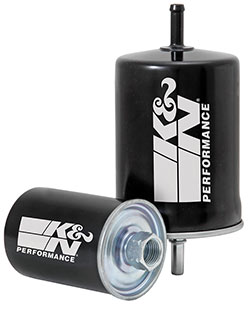
Problem is with vehicle owners not following K&N directions on cleaning and oiling.this is where your MAF will get contaminated.then you will find problems with MPG and performance.cleaning the MAF every 20-30,ooomi is necessary to keep the computer working correctly to adjust for maximum effeciency. the filter does a great job of keeping the intake passageways from dirt.I have used a white cloth and found the interior air ducting clean.paper also works the same. I disagree with K&N filters letting debris thru.I keep my vehicles a very long time. The K&N's got the same (or a little less) mileage and let more dirt through, but had more horsepower at WOT. In general, the more you filter, the higher the pressure loss, and the lower the flow. I've been back to stock configuration for 3 years now and do not regret it in the least. Bottom line was maybe more HP with the FIPK at WOT but none of the two produced more MPG and the FIPK was way too loud. I ran a stock replacement and a FIPK system on my '98 K2500 7.4 Sub. I've got trophies that will say the K&N's made it happen rather that my skill.

I ran K&N on all my dirt and street bikes and loved it. But then again, who do you really believe in these test results. There was a thread about 3 years ago that had a link to a test run by some well know names (Icouldn't find it to post here) comparing K&N, etc to stock AC-Delco, Fram, Wix, etc. The PCM/VCM (not EMC) then adjusts the fuel flow as needed and determined by the TPS, MAF, etc. In most cases you are setting the air flow. That kind of depends on what you mean by stepping on the gas pedal. When you step on the gas peddle, are you setting the gas flow or the air flow? Here's a little test of your car knowledge. Bet money or a case of beer, or something So why did it? Is it because you made a math error? Did you remember your mileage incorrectly? Did you make other changes to your truck at the same time? Maybe the engine management system doesn't do a good job of controlling air/fuel and allows the engine to run lean. Your mileage shouldn't have gotten better. And this is what I really want to find out. Now, this doesn't absolutely mean your mileage didn't get better. So, if you and your buds learned about cars with these older engines, or if y'all were taught by someone who used to work on older cars, they may not have figured out the difference.


Installing a higher flow filter could make the engine run lean and improve fuel economy. Older engines without engine management systems are different.

Modern engines should control the air/fuel ratio at a constant, and mileage should be the same. Ask your buddies WHY the K&N filter should impove mileage. In 1996 I purchased a K&N filter ,still in use today ,this has saved me from purchasing a new filter 12 times now.I feel I got my use out of it.and saved money. If you want to save money K&N filters and any air filters that are cleanable are ways to improve performance but not mileage. Maybe there was something else you did at the same time. For those of you who think you saw better mpgs, it might be interesting to discuss why you think so.
K AND N FUEL FILTER FULL
Unless your filter was REALLY dirty, such that you found yourself at, or near full throttle most of the time, these filters should actually make your mileage a little worse. So, if you're trying to improve your mpg, save your money. Older posts on this same forum are filled with folks swearing they should improve mileage, and that they actually do. From some recent posts, it seems folks on this forum have finally figured out that installing a high efficiency air filter, like the K&N, doesn't, and shouldn't improve fuel economy.


 0 kommentar(er)
0 kommentar(er)
